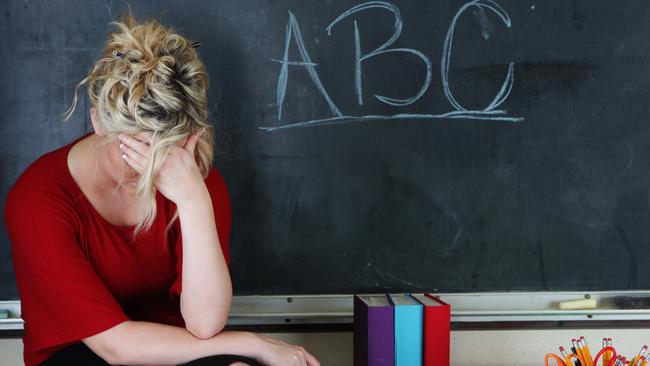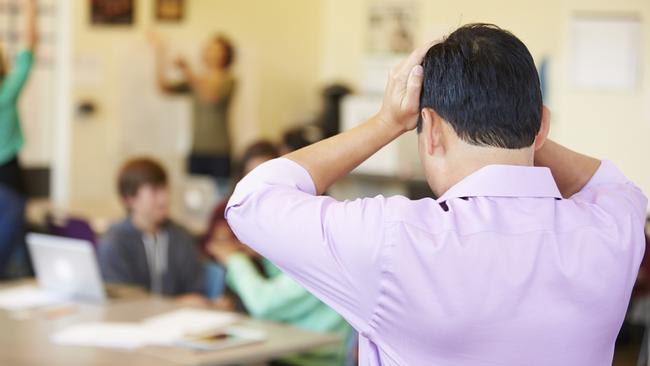Troubled kids as young as four causing teachers mental health issues
Violent students and kids as young as four with behavioural problems are among the shock issues putting our educators under immense pressure — to the extent that hundreds of teachers are developing mental health problems of their own.
VIC News
Don't miss out on the headlines from VIC News. Followed categories will be added to My News.
Teachers are being driven out of classrooms by problem kids and job stress, with more than 500 suffering mental injuries in the past three years.
A Sunday Herald Sun investigation has uncovered the heavy toll on our teachers, as even preschool staff battle to manage four-year-olds with severe behaviour problems.
Spiralling rates of mental illness among students are putting educators under pressure like never before and seeing hundreds burn out and develop mental health problems of their own, including PTSD.
A LaTrobe University study into teacher-targeted bullying found 80 per cent of teachers were victims of harassment in the past year.
A shocking 10 per cent of teachers reported being hit or punched by a student.
Kids yelled and swore at teachers, assaulted them, made disparaging remarks both in person and on social media and damaged their personal property, the national study reveals.
They also stood over teachers or invaded their personal space, ganged up on, and plotted against them with other students, lied to get teachers into trouble and harassed them though texts and phone calls.

And the abuse does not stop in the classroom.
Australian Catholic University’s latest annual principal wellbeing survey found 45 per cent of school leaders were threatened with violence in 2018 and 37 per cent were attacked; the highest levels since the survey began in 2011.
More than 500 WorkSafe claims have been made by teachers for mental injuries over the past three years, and nearly 160 this year so far.
It comes as a major mental health survey by the Victorian branch of the Australian Education Union (AEU) shows most teachers in schools and kindergartens are stressed, with fears of students hurting themselves or others due to behavioural or mental health problems and juggling ever-increasing workloads and expectations largely to blame.
“We are getting a lot of phone calls about what’s happening (and) I think the overriding issue ... is about workload and the constant stress that applies to teachers as consequence of that. It comes out in a whole range of ways and doesn’t go away because you’re dealing with it on a daily basis, with often large numbers of students in a class, from all sorts of backgrounds,” AEU president Meredith Peace said.
“We hear from members who might go out on WorkCover or on sick leave for stress related injuries and it can often be a result of something specific which has happened or it can be cumulative over a period of time.”
Teachers could reach breaking point over a single incident, like a complaint from parents, “or it could be a difficult encounter with a student in the classroom or as severe as an assault”, she said.

Teachers often worked more than 20 unpaid hours a week, to plan classes, mark work and cater for students’ individual learning and, increasingly, mental health, needs — and many good teachers were leaving the industry because they could no longer cope, the Sunday Herald Sun was told.
For kindergarten and daycare educators, who have less access to psychological support for kids than schools, the stress is now extreme.
Nearly 84 per cent of preschool educators surveyed said they were teaching children — mostly four year-olds — with mental health and behaviour problems.
Serious behavioural or anger management problems, anxiety, depression and even self-harm were named among the issues affecting the ability of preschoolers to learn, and stressing teachers.
Nearly 64 per cent of early childhood staff say they are stressed most, or all, of the time with 42.3 per cent claiming they suffer from anxiety and 16.5 per cent from depression, as a result of their work.
“I have had a mental breakdown, that had accumulated over a number of years in a stressful work environment. I was crying on my way to work most days and putting on a smile when staff, children and families arrived. I did some serious damage to my self-worth and am not yet better. I wish I had recognised what I was doing to myself,” one preschool teacher said.

Ms Peace said because kindergartens were sometimes run by local councils and community groups, it could be hard for teachers to access specialist support for challenging kids.
“In early childhood settings they don’t necessarily have that system support from the Department of Education ... and I think that makes it all the more difficult,” she said.
When it comes to primary and secondary, teachers in schools with a low socio-economic status (SES) in large regional centres are doing it toughest, the AEU states in its recent submission to the Royal Commission into Victoria’s Mental Health System.
Despite this, schools in metropolitan Melbourne are more likely to have mental health experts on staff than regional schools.
And staff welfare and wellbeing support is “patchy” across the state, with some survey respondents reporting their school had good procedures in place for stressed staff, while others had little or nothing.
While the union welcomed the State Government’s announcement last week of nearly $245 million to attract teachers to the most challenging schools and hard to staff roles - as well as for more teachers and extra support for learning specialists - far more investment was needed to address the issue of mental health, teacher workloads and to reduce workplace stress, Ms Peace said.
Rosebud Secondary College humanities teacher Deb Fischer said she had been teaching for 35 years and loved her job.
“I’ve probably met five awful teenagers in my entire career. I love teenagers; they’re fantastic,” Ms Fischer, 60, said.

What she has observed, however, is the home and social lives of many teens growing increasingly difficult and a corresponding rise in mental health problems among students, which is adding exponentially to the workload and stress of teachers.
There were more poor and struggling students in her classes than there used to be, Ms Fischer said.
“The kids themselves haven’t changed over the years, but the nature of the problems they are experiencing have changed and are less easy to deal with — things like homelessness, severe poverty, parents not having enough money to survive, those sorts of things seem to be getting worse, and the behaviour of the kids seem to reflect that. If they are exhausted, if they are hungry; those things affect their behaviours,” she said.
Ms Fischer has also experienced first-hand the growing pressure on public school teachers to do more, with less, and watched good educators leave the industry because they could no longer cope.
The hours — many unpaid — are long, and the work is physically, intellectually and emotionally tiring.
“It’s a stressful job at its heart anyway — it’s complex and draining because you are constantly dealing with kids as human beings, and you need to be constantly patient, listening and diagnosing what their individual learning needs are ... so juggling that, together with a big workload and little or no down time, is really quite hard,” she said.
MORE EDUCATION NEWS
TOP VICTORIAN SCHOOLS’ EYE-WATERING 2020 FEES
MEGA FUNDRAISERS: AUSTRALIA’S TOP 100 SCHOOLS
“I’ve seen teachers take stress leave and I’ve seen a lot of very good teachers leave the profession and that’s a big tragedy but the demands (on teachers) just seem to be ever increasing. A high level of stress is a regular part of the job but when there are extra stresses placed on top of that, for many people, that can tip them over the edge.”
The Department of Education and Training (DET) said teachers, principals and school support staff were the foundation of the State’s education system, and it took their wellbeing and safety very seriously.
“School excellence relies on principals, teachers and education support staff being healthy and safe as their wellbeing contributes to a positive school culture and maximises teaching and learning outcomes,” a spokesman said. “We are taking action to ensure Victorian teachers and students have safe and supportive environments to teach and learn in.”
The government is also rolling out a $51.2 million Mental Health Practitioners in Schools initiative so that every public secondary school in the state would be supported by a qualified mental health practitioner.
